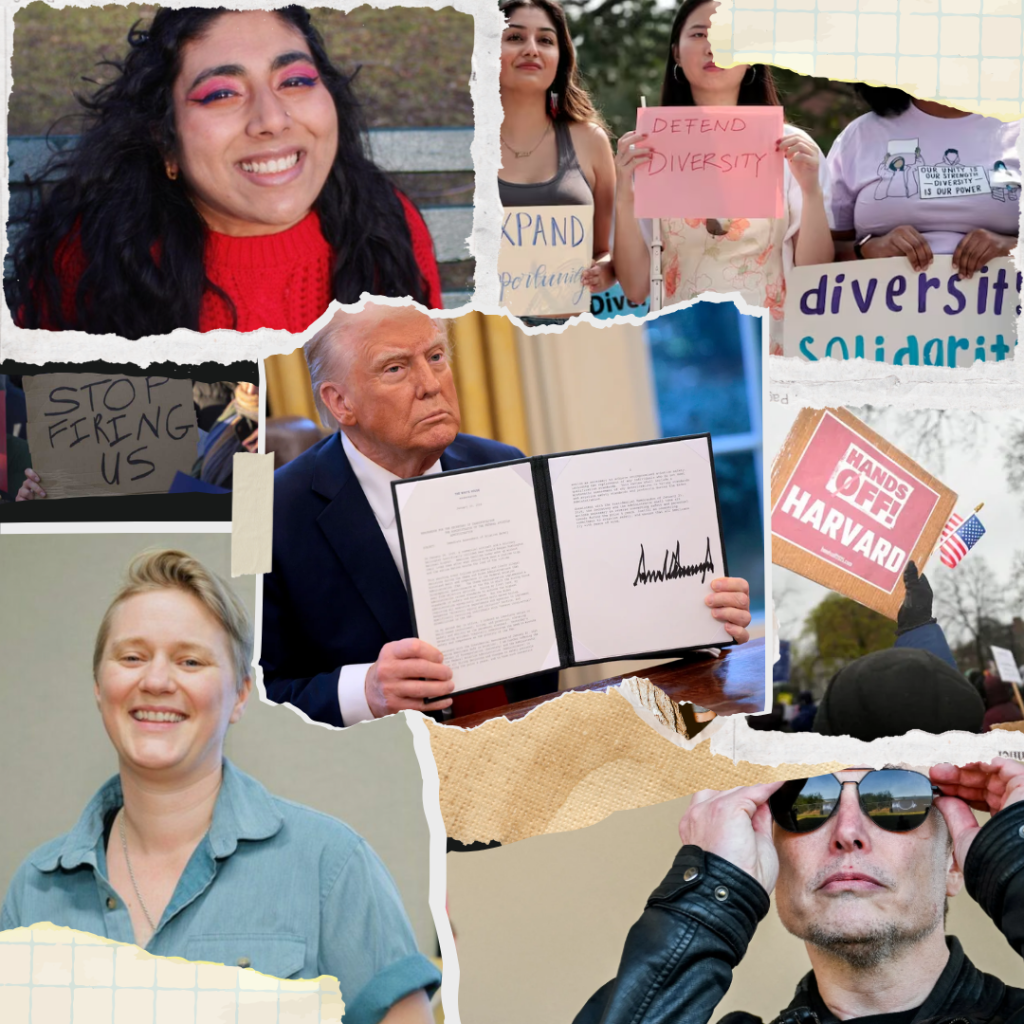Laid Off but Not Left Behind: The Human Cost of DEI’s Dismantling
By Jack Noveck Holmes
“Political regression is part of the process of change – as things change, I must change too.”
Liberty Gonzalez
“I found out when I got out of the subway station – it was really dramatic. I was sitting in my wheelchair and it was pouring rain. I saw the email and it said, ‘Your position has been terminated, effective immediately.’”
Shruti Rajkumar, a 24-year-old journalist who was formerly the sole disability reporter at HuffPost, recalls the harrowing moment in which her job – and livelihood – disappeared unexpectedly. “It was just really shocking. I was hit with a lot of anxiety, and just kind of frozen.”
In early February, Rajkumar was among a wave of HuffPost reporters who were laid off from their roles within the publication. But her dismissal wasn’t simply another belt-tightening measure in an industry that has faced hardship in recent years – rather, it was part of a growing, disturbing national trend, in which Diversity, Equity and Inclusion initiatives, offices and positions across the country have been nullified and eliminated.
“Americans deserve a government committed to serving every person with equal dignity and respect,” declared President Donald Trump in his very own Executive Order 14151, promptly signed into force on Jan. 20, his second inaugural day in office. On their own, these words represent a pillar of the idealistic American dream. Within the context of this executive order, however – ostentatiously titled “Ending Radical and Wasteful Government DEI Programs and Preferencing” – they’re shrouded in a veil of brazen hypocrisy.
Trump’s order asserts the initiative to fiercely eliminate DEI programs in the federal government within 60 days of its signing. It’s an audacious rebuke of former President Joe Biden’s E.O. 13985, which mandated the advancement of DEI efforts across the federal organizations – in an almost poetic display of contrast, also signed on his inaugural day in office in 2021.
A night and day disparity in leadership from the past four years, Trump’s second administration has fired the starting gun in what will be a brutal and unforgiving race for tens of thousands of American DEI professionals to salvage their careers – and not just those that were formerly employed by our nation’s government.

🔊 Rajkumar’s story is just one example of how this shift has rippled beyond Washington. For Rajkumar, her role, and the beat it focused on, represented far more than just a job. . Diagnosed with brain cancer at the age of two, a tumor on Rajkumar’s brain stem resulted in a physical disability that has hindered her ability to walk for most of her life. As a disabled journalist reporting on a community that is integral to her identity, Rajkumar brought lived experience to a beat that is rarely prioritized. Rajkumar brought lived experience to a beat that is rarely prioritized. 🔊 “There are very few openly disabled journalists in newsrooms,” she said. “We all kind of know each other.”
At HuffPost, Rajkumar covered stories that many larger outlets failed to take note of, from legislation that threatens to strip disabled students of critical university accommodations to 🔊 a long history of policies that have criminalized disabled people for simply existing in public . 🔊 “Disability is always forgotten,” she said. “If newsrooms cared about disability as much as they should, we would have a disability beat reporter in every outlet.”
This ruthless DEI purge has nnot been limited to the public sector. Major corporations have willingly bent the knee to the president’s anti-DEI agenda, with Meta, Google, Walmart, McDonald’s, Deloitte and more announcing sweeping rollbacks in their DEI policies. These changes encompass a wide spectrum of approaches from cosmetic – the removal of pronouns from the emails of Deloitte’s U.S. employees who work government clients – to unabashed – Walmart’s removal of certain LGBTQ+-themed products on its website, dissolution of it’s $100 million Center for Racial Equity nonprofit, and eradication of the term “diversity, equity and inclusion” from company documents.
Vickee Jordan, a senior communications advisor to Fortune 500 executives and partner at FGS Gobal, believes that these corporate rollbacks aren’t just about budget cuts – they’re inherently political. “I think there is a common belief that these large, major corporations – who have invested not only business dollars, but advertising resources, human capital, and reputation – were kowtowing or “bending the knee” to Donald Trump, Stephen Miller and Russell Vought,” she said. “[Trump, Miller and Vought] have made it very clear that they do not believe that diversity, equity and inclusion is supported by current law, which is a fallacy.”
Bob Carter, a Chula Vista-based Senior Process Engineer at Cisco, is among the faction of Americans in staunch support of Trump’s approach to social justice in the federal workplace. “DEI of itself is a noble goal,” the engineer prefaced to me in a brief exchange over LinkedIn Messaging. “But unfortunately many companies have weaponized it through quotas and biased training. The quotas are what cause issues for those who are hired from a minority group, because of the potential of less valid qualifications creating a shadow of doubt.”
His LinkedIn profile, devoid of a user image or any information not strictly related to his profession or education, reflects counsel he’s received from his peers: “I have been advised to keep a low profile regarding [his opinion of DEI].” Nonetheless, Carter seems relatively self-assured in making his views on the subject known, having posted a written endorsement of Trump’s DEI overhaul to his profile just one week before we spoke.
“As an educated Black professional, I fully endorse this administration’s dismantling of DEI,” the post reads. “It will take a couple of years to weed out the less qualified DEI hires, but we will ultimately reach higher efficiencies and will finally get beyond the ‘Is he a DEI hire?’ stigma.”
This particular attitude of Carter’s, as Jordan describes it, is the concept of “anti-wokeness.” But what’s often excluded from this discourse, she points out, is objective fact. “What it’s a euphemism for is giving privilege back to white people, saying that white people are now being discriminated against because of DEI,” she said. “I have never seen any proof of that. In fact, when you really look at diversity statistics – which we have multiple decades of – the biggest beneficiaries of DEI policies have been white women.”
And yet, Jordan speculates there may be a second, quieter motivation behind the rollback. “I believe some of these organizations were looking for an out from this pressue” she said. “What you might be able to prove through good research and data is that they were tired of getting these appeals not only from national civil and human rights organizations, but they were also getting local requests,” she explained. “They were getting requests from the local Baptist Church down the street, the synagogue down the street, the Kiwanis Club. At some point, your global DEI leader is completely flummoxed.”
Carter’s affirmative belief, delivered in a relatively low-profile, restrained manner, is a fascinating example of how many Americans are transitioning towards becoming more at ease in sharing their views under Trump’s second administration. His comfort in publicly sharing this sentiment carries added weight when considering the fact that his post came shortly after his boss, Cisco CEO Chuck Robbins, defended the company’s DEI initiatives. “You cannot argue with the fact that a diverse workforce is better,” Robbins said in an interview at Davos in late January.
What Robbins’ view may be considering – and what Carter’s may be omitting – is the livelihoods of DEI and social justice professionals, who in the past month have faced the imminent threat of their means of paying their bills being eradicated. Liberty Gonzalez, a DEI Portland-based consultant, coach and educator, has worked for over a decade with a wide range of leaders, organizations and communities to integrate and embrace values and practices of inclusion in their workplace culture. Now, Gonzalez is seeing the demand for their work all but vanish.
“We’ve had a number of clients, or potential clients, who were almost ready to sign a contract either back out or say they have to postpone or hold off while they reassess things,” Gonzalez said. “It doesn’t always sound like a ‘No, we’re not doing this, we’re done with DEI.’ Oftentimes it sounds like a scaling back or a slowing down or budget cut kind of conversation.”
The underlying reason behind this reassessment? Fear, Gonzalez says. “[The DEI rollback] has created a mass scare,” they said. “Even people who might have stood by their values are too scared to do it now – they don’t know what the consequences are going to be for them.”
This fear, however, is nothing new, especially for Jordan. Her father, Vernon Jordan, was a prominent civil rights attorney who served on numerous corporate boards and a close advisor to President Bill Clinton. In the summer of 1980, she traveled with him as he delivered speeches throughout the country, preaching Democratic values, the rule of law and the crucial importance of voting.
“As we were flying back from one of the trips, I said, ‘Dad, you’re really saying some tough things out there, you are really putting it to ‘em,’” she remembered. “He said ‘You gotta do it. You gotta tell them what’s going on. You gotta shake them up.’” Just weeks after their conversation, Jordan’s father was the victim of an assassination attempt by white supremacist John Paul Franklin. “It was an exploding bullet,” she said. “He spent over 90 days in the hospital. But he survived it. It didn’t frighten him. He kept on going.”
What has resulted is a dramatic reshaping of the American workplace. Following the murder of George Floyd, corporations across the country scrambled to illustrate their commitment to racial equity in fine print – DEI departments were seemingly built overnight. Just haf a decade later, these same departments find themselves being dismantled at similar breakneck speeds.
Gonzalez has been forced to bear the brunt of this rapid change. 🔊 “Certainly one of the most difficult aspects has been figuring out how I’m going to pay my bills, and with that staying aligned with my values,” they said. “There’s been a measure of needing to stay super grounded and adaptable, and really put the principles that we’re teaching people into practice.”
For Jordan, she sees the stakes as not solely financial, but foundational to the operations of these corporations and our government as a whole. “You have to have diverse voices around the table, otherwise you’re not serving the country,” she said. “That’s what I think is so sad about what’s going on with the Trump administration.”
Yet even despite the slowdown in business, Gonzalez has maintained a glass-half-full approach to their work. 🔊 “The return of the Trump administration has given us all an opportunity to see who really stands by those commitments, and who are unwavering in their values around implementing culture change in their organizations,” they said. “I’m really grateful, because it helps me as a practitioner – and just somebody who cares – to be able to assess who is just there to be part of market trends and capitalize off of whatever social pain people are experiencing.”

Rajkumar echoes a similar sentiment. “This has been a really great opportunity for me to work freelance, as well as look at how I can lean more into covering disabilities,” she said. “I feel like now I’m able to write for sections and news organizations that are more aligned with my passions.”
Jordan likewise sees this moment as a litmus test. “The smart companies are really looking at their values as an organization,” she said. “They’re saying, ‘our market share comes from 35% minority and women buyers and our employees are 30% diverse,’ and they’re looking internally at themselves and measuring their actions against their own values and shareholder interests.”
Both Rajkumar and Gonzalez remain vigilantly committed to their work. In early April, Rajkumar entered into a contributing writer position at Prism, an independent, nonprofit, women of color-owned newsroom for which she had also been freelancing following her departure from HuffPost. Gonzalez, on the other hand, continues to reimagine ways in which their work can reach those who need it – even if the term “DEI” may be falling out of favor.
🔊 “Political regression is part of the process of change,” Gonzalez said. 🔊 “As things change, I must change too.”
